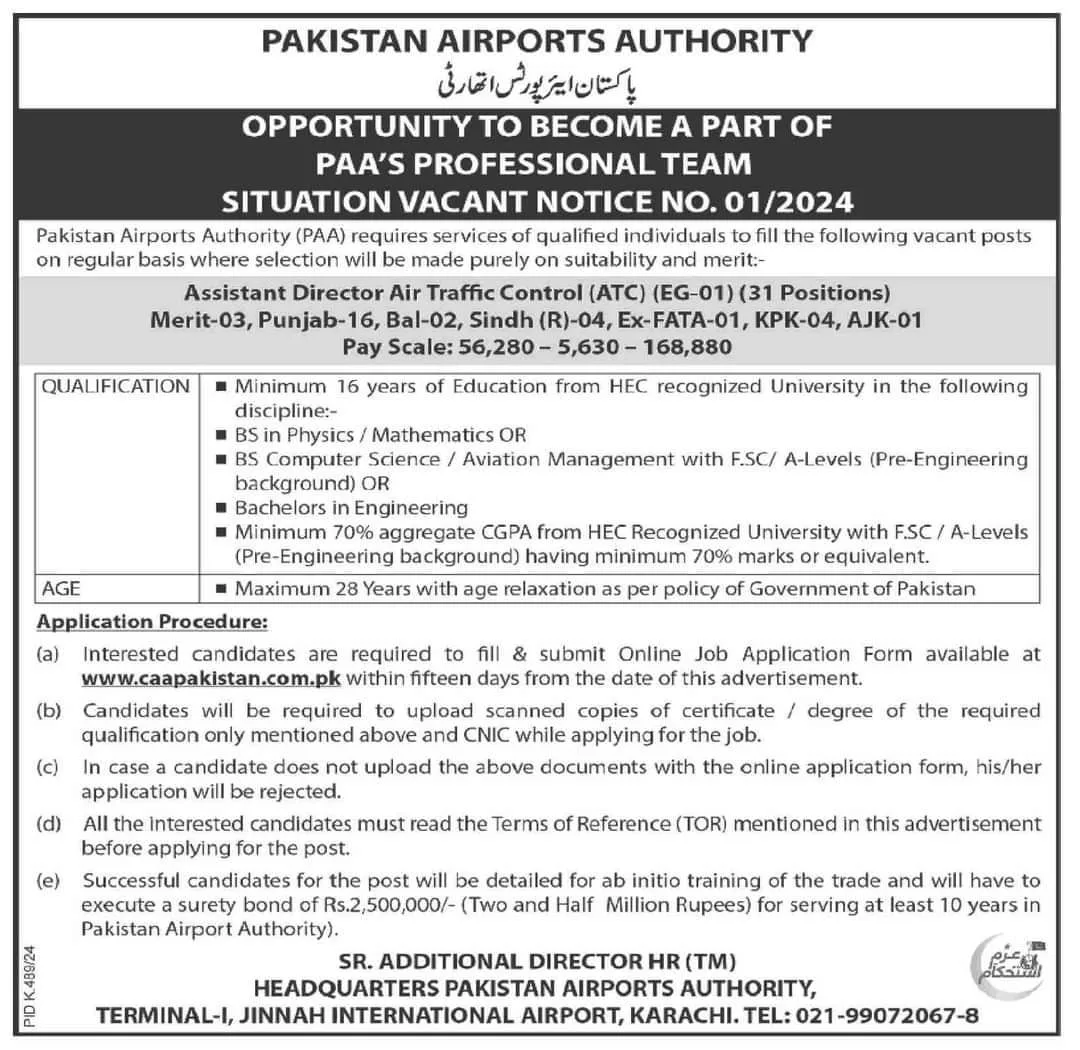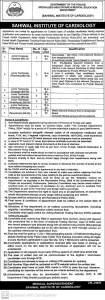
Exciting Career Opportunity: 31 New Assistant Director (Air Traffic Control) Positions at Pakistan Airport Authority
Table of Contents
The Pakistan Airport Authority aviation sector is a critical component of Pakistan’s infrastructure, facilitating not only domestic connectivity but also international travel and commerce. The Pakistan Airport Authority (PAA), a key player in this sector, is currently offering 31 new positions for the role of Assistant Director (Air Traffic Control). This is a significant opportunity for those aspiring to play a pivotal role in ensuring the safety and efficiency of air traffic management in Pakistan. In this post, we’ll explore the importance of the Assistant Director role, the responsibilities involved, the qualifications required, and how to prepare for this career opportunity.
The Role of Pakistan Airport Authority
The Pakistan Airport Authority is responsible for overseeing the operation and management of airports across the country. This includes ensuring the safety of air traffic, managing airport infrastructure, and coordinating with various stakeholders to provide seamless air travel services. As the aviation industry continues to grow, the demand for skilled professionals to manage air traffic control operations becomes increasingly critical.
Overview of the Assistant Director (Air Traffic Control) Position
The Assistant Director (Air Traffic Control) is a key position within the PAA, tasked with overseeing air traffic control operations at airports. This role is vital for ensuring that air traffic is managed efficiently, safely, and in compliance with national and international aviation regulations. Here’s a closer look at the responsibilities, qualifications, and impact of this role.
Key Responsibilities
- Air Traffic Management: Overseeing the day-to-day management of air traffic control operations. This includes coordinating with air traffic controllers to ensure the safe and efficient movement of aircraft within controlled airspace.
- Safety and Compliance: Ensuring that all air traffic control procedures comply with national and international aviation standards. This involves implementing safety protocols and conducting regular audits to maintain high safety standards.
- Operational Coordination: Coordinating with various departments within the airport, such as ground services and aviation security, to ensure smooth operational flow. This includes managing communication between pilots and air traffic controllers.
- Training and Development: Supervising and training air traffic control staff to ensure they are well-equipped to handle their responsibilities. This includes providing guidance on best practices and emerging technologies in air traffic management.
- Crisis Management: Handling emergency situations and managing disruptions in air traffic. This involves making quick decisions to ensure safety and minimize delays.
- Performance Monitoring: Monitoring and evaluating the performance of air traffic control operations. This includes analyzing data to identify areas for improvement and implementing strategies to enhance efficiency.
- Technology Integration: Staying abreast of advancements in air traffic control technology and implementing new systems and tools to improve operational effectiveness.
- Reporting: Preparing reports on air traffic control activities, incidents, and performance metrics. This includes presenting findings to senior management and making recommendations for improvements.
Qualifications and Skills Required
To qualify for the position of Assistant Director (Air Traffic Control), candidates must meet certain educational and professional requirements:
- Educational Background: A Bachelor’s degree in Aviation Management, Air Traffic Control, Engineering, or a related field is typically required. Advanced degrees or specialized training in air traffic control are advantageous.
- Professional Experience: Significant experience in air traffic control, preferably in a supervisory or managerial role. Experience working in a high-pressure environment and managing complex air traffic scenarios is essential.
- Certification: Certification from a recognized aviation authority or body in air traffic control is required. This ensures that candidates have the necessary skills and knowledge to perform their duties effectively.
- Technical Skills: Proficiency in air traffic control systems and technology. Candidates should be familiar with radar systems, communication tools, and other equipment used in air traffic management.
- Leadership Abilities: Strong leadership skills to manage and guide a team of air traffic controllers. This includes the ability to make decisions under pressure and provide clear direction to staff.
- Communication Skills: Excellent verbal and written communication skills are crucial for interacting with pilots, airport staff, and other stakeholders. The ability to convey information clearly and effectively is important for safety and operational efficiency.
- Analytical Skills: Strong analytical skills to assess air traffic data, identify trends, and make informed decisions. This includes the ability to solve complex problems and implement effective solutions.
- Attention to Detail: A keen eye for detail to ensure accuracy in air traffic management and adherence to safety protocols. This is critical for maintaining high standards of safety and efficiency.
The Impact of the Role
The Assistant Director (Air Traffic Control) plays a crucial role in maintaining the safety and efficiency of air travel in Pakistan. Here’s how this role impacts the aviation industry and the broader public:
- Enhanced Safety: By overseeing air traffic control operations and ensuring compliance with safety standards, the Assistant Director helps prevent accidents and ensure the safety of passengers and crew.
- Operational Efficiency: Effective management of air traffic contributes to smoother operations at airports, reducing delays and improving the overall travel experience for passengers.
- Crisis Management: Skilled crisis management ensures that disruptions and emergencies are handled promptly and effectively, minimizing impact on flight schedules and passenger safety.
- Professional Development: By training and mentoring air traffic control staff, the Assistant Director contributes to the development of a skilled workforce capable of handling complex air traffic scenarios.
- Technological Advancement: Implementing new technologies and systems improves air traffic management and keeps the airport operations at the forefront of industry standards.
Preparing for the Role
For those interested in applying for the Assistant Director (Air Traffic Control) positions, here are some steps to prepare:
- Understand the Requirements: Carefully review the job description and qualifications required. Ensure that your background aligns with the responsibilities and skills needed for the role.
- Gain Relevant Experience: If you are not already in an air traffic control role, seek opportunities to gain experience in related positions or obtain additional training and certification.
- Enhance Skills: Develop your leadership, communication, and analytical skills. Consider taking courses or attending workshops related to air traffic management and crisis handling.
- Prepare Application Materials: Tailor your resume and cover letter to highlight your relevant experience and qualifications. Be sure to emphasize your leadership abilities and technical expertise in air traffic control.
- Prepare for Interviews: Be ready to discuss your experience and approach to air traffic management. Prepare examples of how you have handled complex situations and contributed to improving operations.
- Stay Informed: Keep up-to-date with advancements in air traffic control technology and industry trends. This will help you bring innovative ideas to the role and demonstrate your commitment to excellence.
Conclusion
The 31 new Assistant Director (Air Traffic Control) positions at Pakistan Airport Authority represent a significant opportunity for professionals in the aviation sector. This role is vital for ensuring the safety and efficiency of air traffic management, and it offers the chance to make a meaningful impact on Pakistan’s aviation infrastructure. For aspiring candidates, understanding the responsibilities and preparing accordingly will be key to securing this important position and contributing to the success of Pakistan’s air travel operations.


